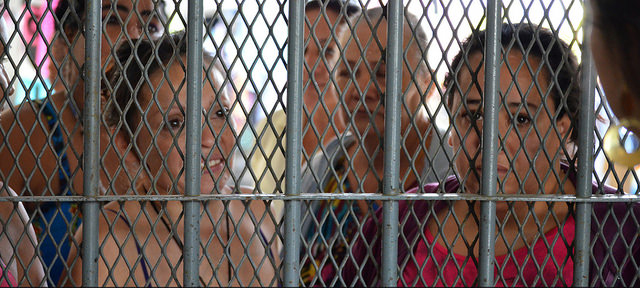
Across Latin America, the effects of disproportionate punishment for low-level, non-violent drug offenses are particularly severe for women. To shed light on this issue, WOLA has created a photo essay to show the human cost of current drug policies in the Americas. The photos tell the stories of four women, each providing a unique insight into the deeply troubling cycle of poverty, low-level involvement, imprisonment, and recidivism into which women are too often pushed.
Over 90 percent of the women incarcerated at Costa Rica’s Buen Pastor prison have more than three children. Providing for those children while they are behind bars can prove difficult, if not impossible. The following women are all serving reduced sentences there for having admitted their involvement in the drug market. Their stories were chosen because they are representative of the profiles often seen in women incarcerated across the hemisphere.
Mother Behind Bars
Lidieth, a 45-year-old mother of four, says she was arrested for selling small quantities of crack and cocaine from her home in order to feed her family. Two of her adult children were implicated in the household business and sent to prison as well. Even from behind bars, she continues to care for her two youngest children, one of which she fears is being abused at home. She is currently serving a plea-bargained sentence of five years and four months.
Failed by the System
Sara, 50, fled her family at age 13 to escape sexual abuse at the hands of her uncle. With no education or opportunities, she became drug dependent and worked in the sex trade, and was eventually arrested for selling small quantities of crack to support her own consumption. Out of desperation, she attempted to bribe the police officer arresting her for selling drugs with the equivalent of US$3.75. She is currently serving a combined seven-year plea-bargained sentence for the two offenses.
Caught in a Vicious Cycle
Johanna, 31, grew up in a household where her parents sold drugs and was therefore exposed to the trade at a young age. When her mother was incarcerated and things got hard for her siblings, she agreed to carry a suitcase of drugs to Europe, but was instead forced to swallow 84 latex-wrapped cocaine packets, which almost killed her. She was sent to prison in Venezuela, but fell back into the trade upon release. She is currently serving a six-year, six-month sentence for selling marijuana.
Life After Prison
“J”, 28, is a single mother of six. She agreed to carry drugs into a prison to feed her family, but changed her mind at the last second and gave the drugs to prison guards. She was arrested and sentenced to over five years behind bars. J benefited from a change to the country’s drug law and was released after just four months, but her criminal record makes it nearly impossible to find work. She has no family support, no home, and no job. Her crime will remain on her record for the next ten years.
Join us in defending the truth before it’s too late
The future of independent journalism is uncertain, and the consequences of losing it are too grave to ignore. To ensure Truthout remains safe, strong, and free, we need to raise $17,000 by midnight tonight. Every dollar raised goes directly toward the costs of producing news you can trust.
Please give what you can — because by supporting us with a tax-deductible donation, you’re not just preserving a source of news, you’re helping to safeguard what’s left of our democracy.